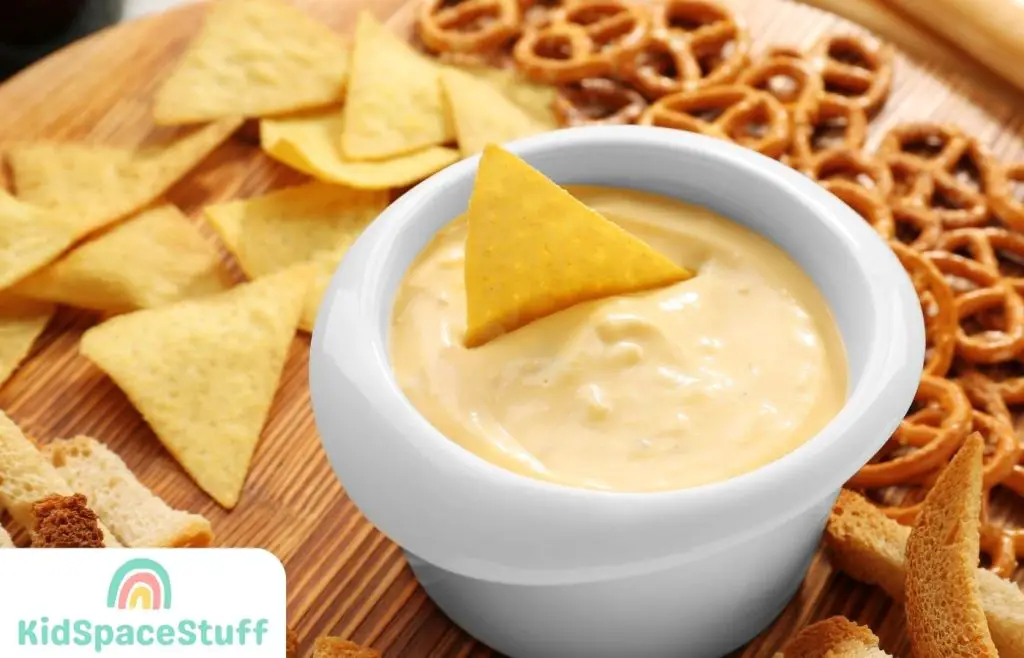If your family is anything like mine, beer cheese is one of the most requested foods at family get togethers.
But can kids eat beer cheese?
In this post, I’ll explore everything you should know about beer cheese and whether or not it’s safe for kids. Let’s dig in!
Can Kids Eat Beer Cheese?
The short answer is yes, kids can eat beer cheese. Although beer cheese contains a small amount of beer, the alcohol content in it is minimal. A typical beer cheese sauce recipe has just one cup of beer in a bowl of dip, with most of the alcohol getting cooked off.
Now, let’s talk about what beer cheese actually is.
Beer cheese is a form of cold pack cheese, sometimes referred to as crock cheese or club cheese. It’s generally made from processed cheese or a blend of cheddar and other cheeses with spices such as cayenne pepper, mustard powder, and garlic.
When it comes to making beer cheese at home, you can easily find recipes like this stovetop beer cheese recipe. One thing to remember is that if you’re making beer cheese for children or anyone who prefers a non-alcoholic version, you can always find recipes that use non-alcoholic beers or other substitutes.
Beer cheese is a delicious and versatile dip or spread that can be enjoyed by both adults and children. The alcohol content in beer cheese is negligible, so there’s generally no need to worry about any effects on kids. Just remember to enjoy it responsibly, and don’t hesitate to explore different recipes that suit your family’s preferences.
Is Beer Cheese Safe for Kids?

As a cheese lover myself, I’ve always been curious about the different variations of this delightful treat.
One that leaves many people scratching their heads is beer cheese.
Originating in Kentucky, beer cheese is a spreadable cheese made from cheddar cheese and/or other processed cheeses. So, naturally, the question of whether or not beer cheese is safe for kids comes up.
Now, I know what you’re thinking – it has beer in it, so how can it be safe for kids?
Well, let me break it down for you.
When making beer cheese, the beer is often boiled, which helps to reduce its alcohol content. Typically, the beer is simmered until it reduces to about ⅓ cup in recipes for beer cheese. This process usually removes most of the alcohol content and leaves behind the flavor. Just like with beer battered fish, it’s generally safe for children and kids.
However, the key thing to remember is that while most of the alcohol is gone, some trace amounts might still be there. So, I’d advise using caution when serving beer cheese to kids and maybe opt for a non-alcoholic version instead if you’re worried.
Is Beer Cheese Healthy?

Well, let me tell you that beer cheese isn’t the healthiest option out there, but it doesn’t mean it’s all bad.
Typically, beer cheese is made from sharp cheddar cheese (or processed cheese with cheddar flavor), beer, garlic, and pepper, preferably cayenne. So, I guess it’s safe to say that it’s mostly cheese and beer – simple yet delicious.
Now, for the healthy part.
Cheese isn’t all that terrible. It has protein, calcium, and even some vitamins like B12. However, you should be mindful of the amount you consume, mainly because cheese is high in saturated fats and sodium.
Speaking of processed cheese, I’d like to point out that it’s generally less healthy than its natural counterpart. I mean, I enjoy the taste and convenience, but be aware of the artificial additives and preservatives it may have.
One of the healthier cheese options is cottage cheese, but it might not work for beer cheese due to its texture. Yet, other options like cheddar or Swiss cheese could be healthier choices than processed cheese. By the way, I always choose low-sodium or reduced-fat cheeses whenever I can to reduce the amount of sodium I consume.
As for the beer part, you could potentially replace it with non-alcoholic beer if you wish to make a kid-friendly version. Remember, though, moderation is always essential.
Beer cheese has some minor health benefits, but it’s not something I’d classify as a health food. If you make it yourself, you can control the ingredients, making it a bit healthier for everyone to enjoy, including kids (with a non-alcoholic twist, of course).
Ingredients in Beer Cheese
Cheese Varieties
When it comes to beer cheese dip or sauce, there are a few different cheese varieties that can be used.
Personally, I tend to use sharp cheddar cheese as my go-to option, as it offers a robust flavor that pairs well with beer. Other popular choices can include Gouda and cream cheese, which provide a different taste and texture in the final product.
One important thing to consider is the color of the cheese.
Some sharp cheddar cheeses are made with an added ingredient called annatto, which gives the cheese a deep orange hue. While this doesn’t change the flavor, it can give your beer cheese a more festive appearance, for those who want a little pop of color.
Beer Choices
The beer you choose is another crucial component in making beer cheese.
For me, wheat beers and malty ales work best, as they offer a perfect balance with the strong flavors of cheddar. Other beer styles like lagers or pilsners can also be used, but their lighter flavors might not stand out as much against the sharp cheddar.
When making my beer cheese, it’s best to always make sure to select a quality beer that you enjoy drinking. The flavors in the beer will come through in the finished dish, so using a beer I genuinely like ensures I’ll love the final result.
The combination of cheese and beer in beer cheese can heavily influence the taste and texture of the final product. Experimenting with different cheeses and beers can lead to unique varieties of beer cheese, perfect for any occasion. Just make sure to avoid making exaggerated or false claims about the ingredients and always use quality components to make this tasty treat!
Alcohol Dissipation in Cooking
When it comes to cooking with alcohol, you might often wonder how much of it actually evaporates during the process. Let’s dig into this topic and find out.
Heat
Heat plays a crucial role in dissipating alcohol in the cooking process.
As a general rule, the higher the cooking temperature, the more alcohol will evaporate. However, this doesn’t mean that all the alcohol will be gone. In fact, a study found that after cooking, the amount of alcohol remaining ranged from 4% to 95%. So, it’s clear that some alcohol will still be present in the dish after cooking, even when exposed to high heat.
Cooking Time
Now let’s talk about how cooking time affects the evaporation of alcohol.
The same study that I mentioned earlier also discovered that alcohol content diminishes with cooking time. For instance, after being cooked for 15 minutes, 40% of the alcohol will be retained. After cooking for an hour, only about 25% will remain, but even after 2.5 hours of cooking, 5% of the alcohol will still be there.
High heat combined with a longer cooking time can help reduce the alcohol content, making beer cheese more suitable for kids. But, keep in mind that there will always be some trace of alcohol left in the dish. So, it’s up to you to decide whether it’s an acceptable amount for your little ones.
Non-Alcoholic Beer Cheese Alternatives

Substitutes
When you want to make a kid-friendly beer cheese, you can often use non-alcoholic substitutes to keep the flavor without the alcohol. One option I’ve found works well is to use non-alcoholic beer as a direct substitute. This way, the recipe can still be called “beer cheese sauce,” as it maintains a similar taste profile.
Another substitute I like to use is a combination of apple cider vinegar and water, with some added spices to mimic the flavors present in beer. This mixture can replace the beer in any beer cheese recipe and still produce a delicious result.
Pairings
When it comes to pairing non-alcoholic beer cheese with foods, the sky’s the limit.
One of my favorite go-to pairings for non-alcoholic beer cheese is still Saltine-style crackers, which are perfect for dipping. I also love pairing it with sliced vegetables like carrots and celery sticks – they add a refreshing crunch to the creamy cheese.
For a more filling option, I like to serve non-alcoholic beer cheese with soft pretzels or crusty bread. And sometimes, I even enjoy it as a topping for my favorite burgers, adding a unique twist to a classic dish.
If you’re seeking a non-alcoholic drink pairing for your beer cheese, a tangy lemonade can be a great option, especially if it’s less sweet and has an herbal touch.
So whether you’re making non-alcoholic beer cheese for your kids or just looking for a more family-friendly option at your next gathering, these substitutes and pairings provide a delicious and accessible way to enjoy this classic dish without the booze.
Serving Suggestion for Beer Cheese
Snacks
When it comes to serving beer cheese to kids, I love offering it as a snack with pretzels, crackers, and fresh vegetables. Not only is it delicious, but it’s an easy way to get kids to eat their veggies! You can also try spreading beer cheese on different types of breads, such as baguettes or even soft dinner rolls, to change things up a bit. Just make sure you’re using a mild beer in the recipe to keep it kid-friendly.
Dishes
If you’re looking for more substantial meal options with beer cheese, get creative with some of your kids’ favorite dishes! A tasty idea is to use beer cheese as a spread for sandwiches or even as a topping on tacos for a fun twist. Just don’t forget the same rule applies: use a mild beer for the cheese. With so many ways to enjoy beer cheese, you and your little ones will never run out of delicious ideas to try together!
Final Thoughts
Beer cheese dip is one of my favorite foods and appetizers.
But can kids consume beer cheese?
In general, yes, beer cheese is fine for kids in moderation. Because some of the alcohol gets cooked off – your beer cheese sauce will be left with minimal alcohol that’s safe for children.
If you want to be extra safe, you can always use a beer substitute – but it’s not necessary.
KidSpaceStuff is a site dedicated to helping parents find the best interior design, activities, and inspiration for their kids.